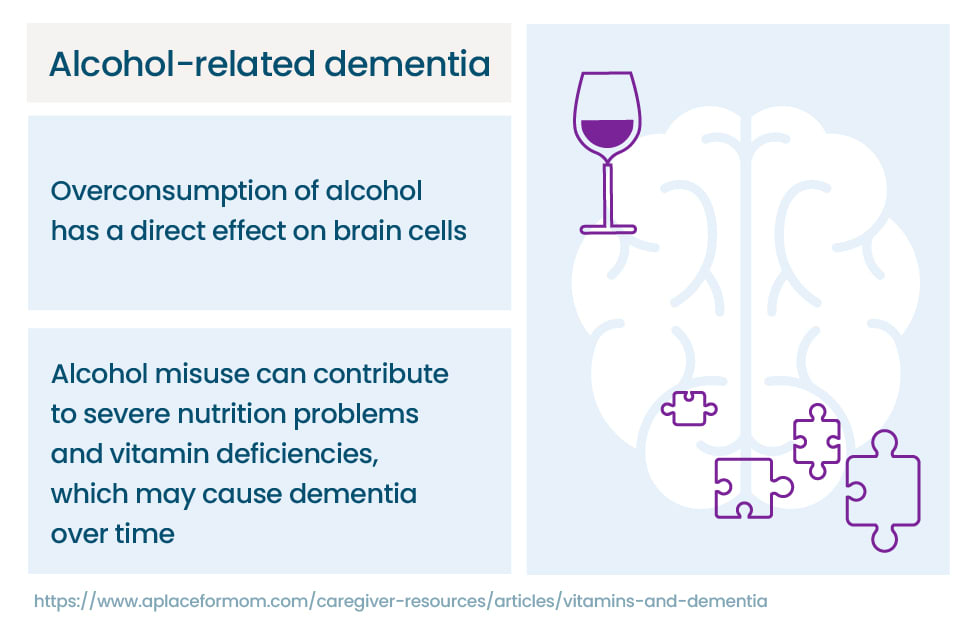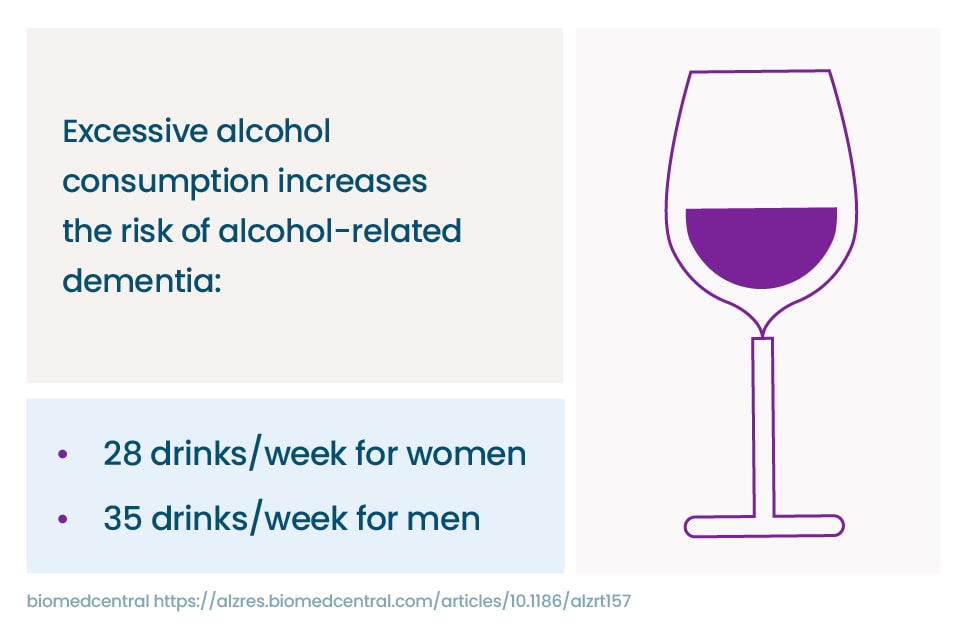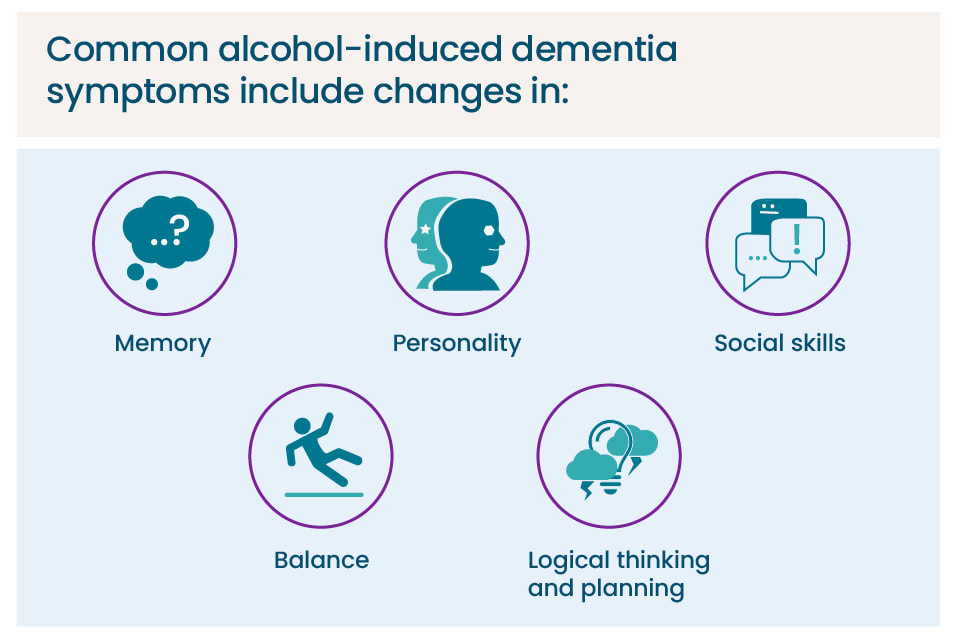Alcohol-Induced Dementia

Over 25% of American adults report at least one instance of heavy alcohol use each month, according to the National Institute on Alcohol Abuse and Alcoholism. Alcohol misuse can cause a variety of health problems, from high blood pressure to heart disease. In some severe cases, it may also cause dementia. Read on to learn more about the types of alcohol-related dementia, common symptoms, key risk factors, and how you can help a loved one experiencing alcohol dementia.
Let our care assessment guide you
Our free tool provides options, advice, and next steps based on your unique situation.
What is alcohol-related dementia?

Dementia is an umbrella term for a decline in cognitive function. People with dementia may have problems with language, memory, thinking, and other necessary daily activities.
Alcohol-related dementia — sometimes called alcohol-induced dementia, alcohol dementia, or ARD — is a type of cognitive decline directly linked to excessive, long-term alcohol consumption. Referred to as “alcohol-induced major neurocognitive disorder” in the fifth edition of the Diagnostic and Statistical Manual of Mental Disorders, alcohol-related dementia is often the result of Wernicke-Korsakoff syndrome, a severe lack of thiamin and vitamin B-1 caused by alcohol consumption.
Overconsumption of alcohol has a direct effect on brain cells. It can affect the way the brain works, resulting in problems with memory, judgment, and decision–making. Alcohol misuse can also contribute to severe nutrition problems and vitamin deficiencies, which may cause dementia over time.
Who does alcohol dementia affect?

Alcohol-related dementia isn’t generally a concern for people who drink rarely or in moderation. In fact, many studies show that mild to moderate alcohol use (one to three drinks a day) may reduce the likelihood of dementia, according to a systematic review published in the journal Neuropsychiatric Disease and Treatment.
Research conducted by the CDC found that African American, Hispanic, and American Indian and Alaska Native adults are more likely to experience dementia in general. Alcohol-related brain damage affects men more than women, according to the Alzheimer’s Society.
Alcohol dementia primarily affects:
- People over the age of 40, though the likelihood increases with age
- People who drink in excess over a long period of time (for women, four or more drinks in one sitting, and for men, five or more drinks in one sitting, according to the CDC)
- People with severe nutritional deficiencies caused by alcohol consumption
Research suggests that a history of drinking 28 alcoholic beverages a week for women or 35 for men increases the risk of developing alcohol-related dementia, according to the journal Alzheimer’s Research and Therapy.
What are common alcohol-induced dementia symptoms?

Many early signs of alcoholic dementia overlap with symptoms of other types of dementia. While behavioral signs are similar, many people with alcohol dementia don’t end up developing symptoms of late-stage dementia, such as loss of language, inability to eat independently, or loss of key motor skills.
Symptoms to look out for include:
- Memory concerns
- Impaired ability to learn new things or recall facts
- Personality changes
- Difficulty with logical thinking and planning
- Balance problems and falls
- Impaired social skills
- Decreased spontaneity or interest in activities
- Repeated questions, stories, or phrases
- Lies or fabricated stories
Since people can develop alcohol dementia before they reach old age, it’s important to monitor your loved one for these symptoms if they have a long history of heavy drinking.
Many of these symptoms may coincide with signs of inebriation — for example, your loved one may often repeat phrases or have balance problems after drinking heavily, according to the Banyan Treatment Center.
For this reason, it’s vital that your relative attend doctor’s appointments or dementia tests without drinking beforehand. Some programs and medical institutions require a period of sobriety before providing an official alcohol-related dementia diagnosis.

Let our care assessment guide you
Our free tool provides options, advice, and next steps based on your unique situation.
What are the types of dementia caused by alcohol?
Two types of alcohol-related brain damage may result in alcohol-induced dementia.
- Korsakoff’s syndrome damages the nerve cells that support the brain and spinal cord, as well as the part of the brain that controls memory function. It results from vitamin B1 deficiency and can be caused by alcoholism.
- Wernicke’s encephalopathy causes damage to the lower parts of the brain called the thalamus and hypothalamus, which regulate memory and emotion.
Korsakoff’s and Wernicke’s are related disorders, both of which stem from vitamin B1 deficiency. Some scientists see them as different stages of the same disorder, which is called Wernicke-Korsakoff syndrome, according to the National Institute on Alcohol Abuse and Alcoholism.
Does alcohol cause Alzheimer’s disease?
Research hasn’t come to a consensus on the effects of alcohol on more common types of dementia, like Alzheimer’s disease. Several animal studies have paired excessive alcohol consumption with changes in brain proteins that can lead to Alzheimer’s and other forms of dementia, according to the Journal of Neuroinflammation.
However, many human studies have shown no correlation between alcohol use and Alzheimer’s, according to a systematic review from Neuropsychiatric Disease and Treatment.
Can people heal from alcohol-related dementia?
It’s possible for someone with alcohol dementia to change course. Most types of dementia are progressive, meaning they get worse over time. Unlike Alzheimer’s disease, vascular dementia, and Lewy body dementia, alcohol dementia may have steady symptoms that don’t progress, especially if a senior receives treatment for alcohol misuse after noticing early signs of alcoholic dementia. Talk to your loved one’s doctor to create a plan of action after a dementia diagnosis.
How to treat alcohol dementia
If a person can stop drinking or improve other lifestyle factors, signs of alcohol-related dementia may remain stable or even improve, according to research published in the journal Age and Ageing. Some interventions include:
- Sobriety. If your loved one is experiencing dementia caused by alcohol, the most helpful form of harm reduction is sobriety.
- Diet. Poor nutrition may make dementia symptoms worse, according to the New York Academy of Sciences. Focus on a dementia diet high in fruits and vegetables and low in refined sugars and sodium. Thiamine and B1 — both reduced by excess alcohol consumption — should be added to your loved one’s diet through foods like pork, fish, beans, and lentils.
- Treatment of comorbidities. Alcohol abuse can increase the risk for heart disease, high blood pressure, and diabetes, according to the American College of Cardiology. These conditions, in turn, increase dementia risks. By addressing possible comorbidities, dementia risks may be reduced.
Drinking and dementia: Is sobriety the solution?
While sobriety seems like a clear and simple solution, it can be incredibly difficult for a person with alcohol use disorder to quit drinking. Quitting “cold turkey” can also be dangerous. For this reason, the connection between alcohol and dementia in the elderly may be a hard obstacle to overcome. Talk with your loved one’s doctor about medical and therapeutic interventions.
Many rehabilitation facilities aren’t equipped to treat people experiencing alcohol dementia; simultaneously, most memory care communities aren’t able to admit people with alcoholism, as drinking and dementia are generally discouraged to avoid confusion, medication mismanagement, and increased fall risks, according to the Alzheimer’s Society.
Remember that sobriety is possible at any age. In addition to talking with your loved one’s doctor, encourage external support. Alcoholics Anonymous offers meetings for seniors, while the Substance Abuse and Mental Health Services Administration hotline can help families find local resources and support groups.
Alzheimer’s Society. Alcohol-related brain damage (ARBD): What is it and who gets it?
Banyan Treatment Center. (2021). Signs of alcohol dementia.
Caspar-Wiegmann, C., Mick, I., Brandl, E.J., Heinz, A., & Gutwinsk, S. (2020, January 9). Alcohol and dementia – What is the link? A systematic review. Neuropsychiatric Disease and Treatment.
CDC. (2025, January 31). Alcohol use and your health.
CDC. (2024, August 27). Reducing risk for dementia.
Ellison, J.M. (2021, August 30). Alcohol and dementia: A complicated relationship. BrightFocus Foundation.
Geneva: World Health Organization. (2019). Evidence profile: Treatment of alcohol use disorder and cognitive decline or dementia.
Kelly, S., Olanrewaju, O., Cowan, A., Brayne, C., & Lafortune, L. (2017, July 20). Interventions to prevent and reduce excessive alcohol consumption in older people: a systematic review and meta-analysis. Age and Ageing.
Morris, M.C. (2016, April 26). Nutrition and risk of dementia: overview and methodological issues. The New York Academy of Sciences.
Napori, N. (2017, January 3). Alcohol abuse increases risk of heart conditions as much as other risk factors. American College of Cardiology.
National Institute on Alcohol Abuse and Alcoholism. (2022, July). Wernicke-Korsakoff syndrome.
Ridley, N.J., Draper, B. & Withall, A. (2013, January 25). Alcohol-related dementia: an update of the evidence. Alzheimer’s Research & Therapy.
Sabia, S., Fayosse, A., Dumurgier, J., Dugravot, A., Akbaraly, T., Britton, A., Kivimäki, M., & Singh-Manoux, A. (2018, June 25). Alcohol consumption and risk of dementia: 23 year follow-up of Whitehall II cohort study. BMJ.
Sachdeva, A., Chandra, M., Choudhary, M., Dayal, P., & Anand, K.S. (2016, February 7). Alcohol-related dementia and neurocognitive impairment: A review study. International Journal of High Risk Behaviors and Addiction.
University of Michigan. (2021, June 9). Alcohol use among older adults.
Senior living options in all states
The information contained on this page is for informational purposes only and is not intended to constitute medical, legal or financial advice or create a professional relationship between A Place for Mom and the reader. Always seek the advice of your health care provider, attorney or financial advisor with respect to any particular matter, and do not act or refrain from acting on the basis of anything you have read on this site. Links to third-party websites are only for the convenience of the reader; A Place for Mom does not endorse the contents of the third-party sites.
Make the best senior care decision
Make the best senior care decision